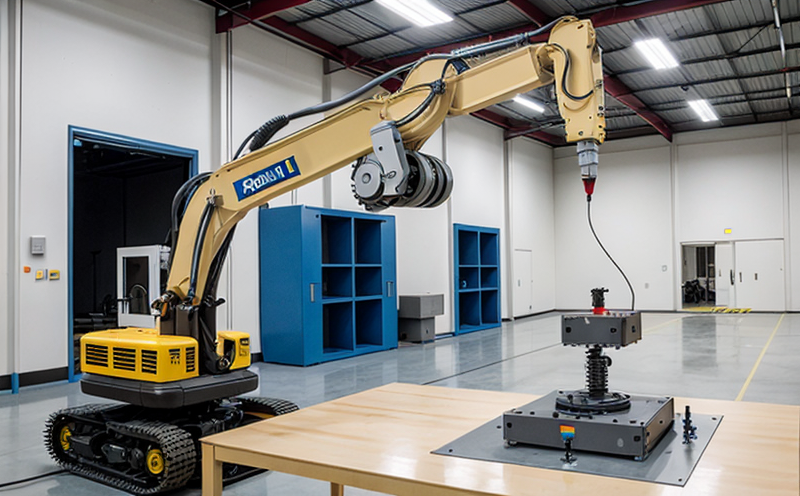ASTM D9909 Feedback Signal Noise Reduction Efficiency
The ASTM D9909 standard is pivotal in ensuring that robotic control systems and motion accuracy testing meet stringent quality benchmarks. This service is designed to evaluate the efficiency of noise reduction within feedback signals, which directly impacts the precision and reliability of robotic operations. In robotics and artificial intelligence systems, signal integrity plays a crucial role. Noise can distort the feedback loop, leading to suboptimal performance and even system failures.
The ASTM D9909 test focuses on quantifying how well a system mitigates noise in its feedback signals while maintaining high levels of accuracy and repeatability. This is essential for industries relying heavily on robotics, such as automotive manufacturing, aerospace, healthcare, and electronics assembly. By adhering to this standard, manufacturers can ensure their systems operate with minimal interference from environmental or internal noise sources.
The test involves a series of steps where the system's ability to suppress noise in feedback signals is measured under controlled conditions. This includes analyzing the signal-to-noise ratio (SNR) before and after processing by the control system. The goal is to identify any degradation in performance due to noise, which could indicate issues with the system design or component selection.
The significance of this test cannot be overstated. In industries where precision is paramount, even small amounts of noise can lead to significant discrepancies. For instance, in surgical robotics used for minimally invasive procedures, even slight inaccuracies can have severe consequences. Similarly, in autonomous vehicles, robust noise reduction mechanisms are crucial for ensuring safe and reliable operation.
The ASTM D9909 test is particularly relevant as the demand for advanced robotic systems continues to grow. As these systems become more complex, so too does the importance of maintaining high standards of signal integrity. This service not only helps manufacturers meet regulatory requirements but also enhances their competitive edge by ensuring top-tier performance.
In summary, ASTM D9909 is a critical tool for quality assurance in robotic control systems and motion accuracy testing. By focusing on noise reduction efficiency, this test ensures that the systems perform reliably under various conditions, enhancing overall product quality and customer satisfaction.
Why It Matters
The importance of ASTM D9909 cannot be overstated in ensuring robust and reliable robotic control systems. Noise in feedback signals can lead to reduced accuracy, increased error rates, and even system failures. This test is essential for several reasons:
- Evaluates the effectiveness of noise reduction mechanisms within control systems
- Ensures compliance with international standards for quality assurance
- Enhances product reliability by minimizing errors due to environmental factors
- Aids in identifying potential design flaws that could lead to performance issues
- Supports continuous improvement and innovation in robotic technology
- Promotes safer operations in critical industries such as healthcare, aerospace, and automotive manufacturing
In essence, this test is a cornerstone for maintaining high standards of quality and reliability in robotics.
Why Choose This Test
- International Standards Compliance: Adherence to ASTM D9909 ensures that your robotic systems meet the highest industry standards, enhancing credibility and trustworthiness.
- Enhanced Accuracy: By reducing noise in feedback signals, this test improves overall system accuracy, leading to more precise operations.
- Improved Reliability: Minimizing noise enhances the reliability of robotic systems, ensuring consistent performance across various applications.
- Regulatory Compliance: Ensuring compliance with ASTM standards is crucial for avoiding legal issues and maintaining market access in competitive sectors.
- Innovation Support: This test provides valuable insights that can drive continuous improvement and innovation in robotic technology.
- Predictable Performance: By identifying noise sources early, this service helps prevent unexpected performance drops, leading to more predictable operations.
Selecting ASTM D9909 ensures that your robotic systems are not only compliant but also meet the highest benchmarks of reliability and accuracy.
International Acceptance and Recognition
The ASTM D9909 standard is widely recognized and accepted in various countries around the world. This ensures that testing conducted according to this standard is universally applicable and respected:
- American Society for Testing and Materials (ASTM): ASTM International, formerly known as the American Society for Testing and Materials, is a global standards organization that develops and publishes voluntary consensus standards.
- European Committee for Standardization (CEN): CEN's standardization work covers all technical sectors except telecommunications. The results of this work are published in European Standards.
- International Organization for Standardization (ISO): ISO is the world’s largest developer and publisher of international standards, which cover almost every available technical field.
- Institution of Engineering and Technology (IET): The IET has been a global leader in engineering excellence since 1871. Their standards are widely accepted across industry sectors.
The ASTM D9909 test is not only recognized by these organizations but is also frequently referenced in regulatory documents and industry best practices worldwide. This widespread acceptance ensures that your testing results are universally applicable, enhancing the credibility of your robotic systems.





